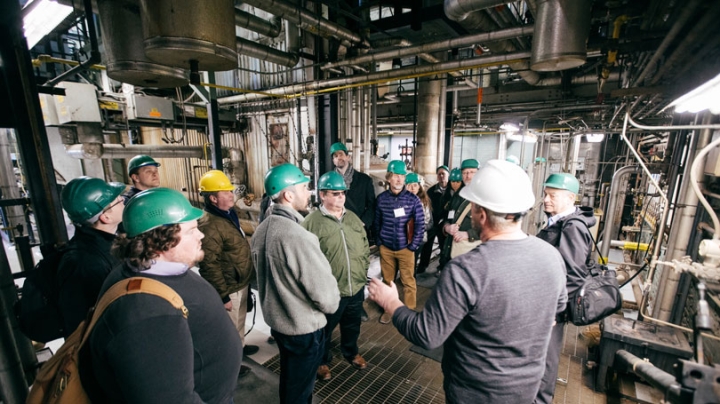Dartmouth will be celebrating Earth Day next week as the institution marks progress toward achieving a set of sustainability goals announced two years ago by President Philip J. Hanlon ’77.
Topping the list is development of the Dartmouth Green Energy Project, a planned $200 million-plus initiative to build a biomass heating facility and hot water distribution system that would replace the existing central steam-heat system and mark a major step toward reducing greenhouse gas emissions, putting the College far beyond the energy marker set out by President Hanlon in 2017.
The College has also had success in projects to be more efficient and sustainable in food and has a corps of students analyzing progress in these and other areas, including recycling and waste. The two years of work followed the 2017 release of a report by a taskforce Hanlon convened a year earlier, on Earth Day 2016. In the report, Our Green Future, the interdisciplinary group of faculty, students, and staff proposed ways to transition to a low-carbon future and recommended addressing sustainability in energy, waste, food, and other areas.
The report led to the president’s pledge to make progress in six areas: reducing greenhouse gas emissions; transitioning off No. 6 fuel oil to renewable sources; establishing a more efficient energy distribution system; studying ways to reduce waste; considering the environmental impact of food choices; and creating a corps of students to track progress.
“We’ve made progress in every single one of these areas,” says Rosi Kerr ’97, Dartmouth’s director of sustainability. “Still, we have plenty left to do. We need to continue to push ourselves not just because it reduces our negative environmental impact and makes Dartmouth sustainable, but also because it makes Dartmouth better.”
Progress on Dartmouth’s sustainability goals will be the focus of an Earth Day Sustainability Forum, set for 6:30 p.m. on April 22, in Filene Auditorium in Moore Hall, featuring opening remarks from Hanlon.
“We hope people turn out to learn more about the work that’s been going on, to share their ideas for the future, and find out how they can help,” says Kerr.
How Far Have We Come?
- The Dartmouth Green Energy Project more than meets three of the president’s 2017 goals: to reduce greenhouse gas emissions from 2010 levels by 50 percent by 2025 and by 80 percent by 2050; transition the heating system from No. 6 fuel oil to renewable sources by 2025; and establish a better system to distribute energy across campus, improving efficiency by 20 percent. The project would allow Dartmouth to transition off No. 6 fuel oil, using biomass—sustainably sourced waste-wood material from area forestry and timber industries and liquid biofuel—to produce hot water heat in place of the steam-heat system now in place. The facility would reduce greenhouse gas emissions from 2010 levels by about 70 percent, far exceeding the 2025 goal. In addition, it would replace the existing steam pipes in more than 110 buildings on campus through a transmission system that would improve heating efficiency by 20 percent.
- Food sustainability: A working group of students, faculty, and staff studied the Dartmouth food system and developed programs to educate Dartmouth diners about the environmental impact of their daily menu choices, especially in the College dining system. A student-designed Green2Go program provides reusable food containers to reduce waste, and the dining service is offering sustainably grown fish.
- Reducing waste: Kerr says improving waste disposal on campus is a thorny issue, in part because of changes in the local and global marketplaces for recycled materials. As markets change, Dartmouth is forced to change its waste handling systems, sometimes in ways that reduce sustainability. A study group is investigating how to develop and implement a more resilient waste system that focuses on reducing the negative impacts of waste on people and the planet. Two examples of ideas to improve the waste system are working with local partners to change waste handling and changing what Dartmouth buys to reduce waste.
- Student Sustainability Corps: Sustainability Corps Manager Marcus Welker and three teams of students are working to conduct measurement and assessment studies that track progress across waste, water, food, energy, transportation, and landscape and ecology. The group, which has been in place for a year, is making data available on the sustainability website.
In addition to the goals Hanlon set out, the College has installed rooftop solar arrays on 12 buildings in the past two years. Together, the solar arrays generate just under 2 percent of the electricity consumed on campus. The College’s engineering and utilities team is working to identify viable sites for larger-scale solar systems to serve the campus and estimate that a large-scale system could generate as much as 20 percent of the electricity needed on campus.
“Our world has a long way to go to secure a sustainable future,” says Executive Vice President Rick Mills. “With these efforts, Dartmouth is looking to keep pace and position ourselves to move ahead of the curve. Construction of the Green Energy Project will be one very visible sign of our commitment to our green future.”
The forum will be broadcast as a Zoom webinar. To access the forum, go to dartgo.org/earthday.
